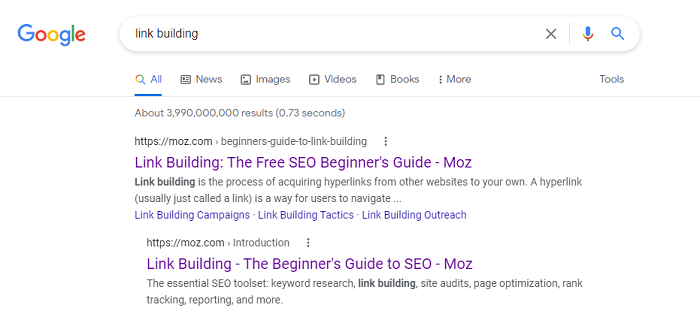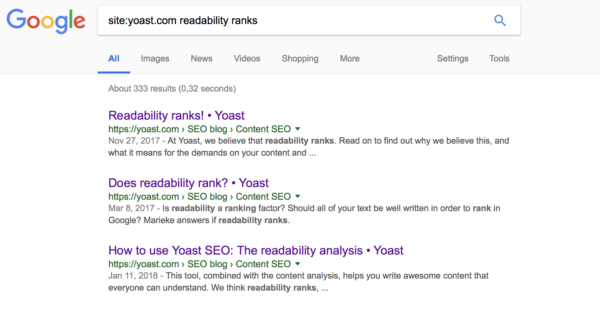One of the major goals of SEO is to rank high on search engine results pages. In order to appear at the top of the results, you need to be ranked for different keywords.
However, in the process of creating content, a business might have multiple pieces of content that address similar topics or industry niches.
While this is great for creating specializations and improving your brand’s reputation, it can lead to a problem known as keyword cannibalization.
Knowing how to avoid it is an important part of your SEO strategy.
But what exactly does keyword cannibalization mean? In this article, we’ll discuss how you can steer clear of it in your future planning and how you can fix the keyword cannibalization you might have in your current content.
What is Keyword Cannibalization?
When you create a piece of content, there are different keywords that you use to try and rank high on the search engine results pages.
As you continue to create new content, you will likely discuss similar topics or even use the same keywords for different pages.
Keyword cannibalization occurs when you have multiple pages that are competing against each other for the same keyword.
It is a common SEO mistake that is made as businesses and brands continue to grow and create more content.
While it’s important that you cover many different topics and have plenty of information available for your audiences, it’s possible to go too far.
When your pages are competing against each other, it can hurt your authority and damage your reputation with Google and other search engines.
Knowing how to avoid keyword cannibalization is important while building out your SEO strategies.
When you can avoid competing against yourself, you can focus on ranking high against your competitors instead of fighting your own pages.
Examples of keyword cannibalization
So, what does keyword cannibalization look like in action? Here’s a closer look at a good example. Let’s say you want to work on your backlink catalog but decide to learn a bit more about effective backlink building first. You might start with a Google search on a key phrase like “link building.”
There’s a possibility that your SERP might contain results like the above—two different posts from Moz. Each page is likely valuable and helpful. They both accurately leverage the target keyword. But they’re so similar that it’s almost impossible to decide which one to click.
Here’s another example featuring SERP results from Yoast on the topic of readability. The first two results are similar enough that Google probably isn’t sure which one is more important. And if Google isn’t sure, your audience probably won’t be, either.
Of course, where your content ranks on a SERP does matter. If your competing results are both ranking highly, you’re probably not losing too much traffic. But if they’re way down on the list, cannibalization is likely part of the reason why.
Why is Keyword Cannibalization an Issue?
Keyword cannibalization confuses both your readers and search engines.
This can seriously impede your chances of ranking high on search engine results pages and increase your visibility and authority on Google.
There are some other factors of keyword cannibalization that are an issue, so let’s talk about some of those now.
Diminishing Authority on Your Pages
The authority of your pages is the reputation they have with search engines. You want your most authoritative pages to rank the highest because they are the ones most likely to result in higher click-through rates and conversions.
When you have keyword traffic split among pages, you reduce the level of authority that each page has and fight against yourself for the top spot. That means that your pages could end up losing their authority.
Hurting Your Conversion Rates
Conversion rates are highly dependent on the pages that your new traffic lands on. If you have traffic going to different pages and are directing new visitors to less authoritative pages, you can risk losing the conversions you are looking for from your most relevant page.
Devaluing Relevant Pages
While search engine algorithms are very advanced, they still aren’t all-knowing or all-powerful. That means that they don’t know the difference in the relevance of your pages.
If you use the same or similar keywords for more than one page, Google is in charge of determining which page fits best with a query that includes that keyword. If it thinks that your main product landing page and a one-off blog are the same, you can lose authority and relevance on your most important pages.
Wasting Your Crawl Budget
Search engine spiders will crawl your website a certain number of times in any given time period, which is referred to as your crawl budget. If you have many different pages that use the same keyword, the amount of crawl budget you have is spent on pages that don’t need to be indexed.
Confusing the User Experience
Users want to have an easy time navigating your website and pages. When they search for different terms, they expect to get to a certain type of page or result.
If your website is displaying different pages for the same term, they aren’t sure of what they will receive and become confused, which creates a poor user experience.
Affects Your Link Structure
Keyword cannibalization can affect your link structure, both internally and externally.
Internally, your links may be leading your visitors to several different pages instead of to the one authoritative page which offers the most value.
Externally, your backlinks will often be split between the pages with the same or similar keywords, not creating the most value for your website.
How to Identify Keyword Cannibalization
Recognizing keyword cannibalism on your website requires a few steps, all of which are simple to master.
Essentially, you need to search your website for any use of specific keywords in multiple pieces of content. Your focus will be on those pages that target the same or similar keywords and seek to respond to the same or similar user intent.
Conduct a site: search
To help you search for these pages, you can conduct a common “site:search.”
Pop over to Google Search and enter your domain plus the topic you want to check on.
It will look like this: Site:yourwebsite.com “topic”
For a specific example, it will look similar to: Site:VideoPros.com (+topic such as “live events”).
Google will return a results list with all the content on your site that relates to the topic.
Examine the list and determine what is ranking the highest.
In particular, you want to see if some of your older content is ranking higher than the more up-to-date articles or blog posts, or the more relevant pages you’ve put in place.
If so, it shows that keyword cannibalization is potentially occurring and points you in the direction of what to review next.
Don’t get overwhelmed by the list, however, as Google is prone to returning many matching and semi-matching results. Not all of those page results are a problem, and many will target other keywords.
Use Google Search Console
Another way to identify potential keyword cannibalization is to try using Google Search Console.
Go to your performance report to see a default query list that your website has received clicks and impressions from most recently.
Via the Pages tab, click on one of the queries. A list of the URLs ranking for that particular query will show, along with the associated stats.
If you see more than one page URL appearing, keyword cannibalization may be at play.
How to Avoid Keyword Cannibalization
Keyword cannibalization needs to be avoided in order to improve your rankings and appear higher in search engines.
Let’s look at a few of these key ways you can learn how to avoid keyword cannibalization and create an SEO strategy that works now and in the future.
When you know how to avoid keyword cannibalization, you can create a more effective strategy for the future.
1. Identify Keyword Cannibalization
The first step to avoiding keyword cannibalization is to identify when it is occurring.
Different online and SEO tools can help you learn when you have different pages ranking for the same keywords and phrases.
You can also use Google searches to help you determine which of your pages are ranking for what.
2. Avoid Keyword Stuffing
Keyword stuffing is a black hat SEO technique that involves shoving a keyword onto a page as many times as possible to trick search engines into thinking that the page is more relevant.
While this is a bad practice all around, it can also lead to keyword cannibalization if you stuff multiple keywords on different pages.
3. Determine What Pages Matter Most
If you have multiple pages that are ranked for the same keyword, you’ll need to take a look at them and see which page matters the most for your needs.
Sometimes it is easy to tell which page is more relevant, but other times you’ll want to think about the goal of each page more carefully.
4. Created a Keyword Strategy
One of the best ways to avoid keyword cannibalization is to create a targeted and detailed keyword strategy for all of your content.
When you have a clear delineation of your keywords and can understand exactly which keywords go to which pages, you can avoid using the same keyword multiple times and competing with other pages.
5. Track Your Keyword Performance
Another way to monitor your keywords and keyword rankings is to keep track of your keyword performance.
Having regular reporting on your keyword rankings and keeping tabs on when pages move up or down in their performance can help you understand exactly when issues arise and when they start to affect your online performance.
6. Focus on Topics, Not Keywords
Rather than spending all of your time focusing on each individual keyword and building your pages around those specific phrases, you can take a step back and instead take a look at the topics you are addressing rather than the words.
That can help you make sure that your new pages and content pieces aren’t using keywords that are ranking on older pages.
How to Fix Keyword Cannibalization in Your Content?
If the concept of keyword cannibalization is new to you, then you’ve likely got some level of it in your existing content.
While it’s important to know how to avoid keyword cannibalization in the future content you create, you’ll also want to fix the mistakes in the past content you have published as well.
To help you get started, you may want to conduct a content audit to identify what you currently have and how it is displayed.
You can also benefit from analyzing the performance of your content and identifying historical rankings as well as current rankings.
Next, take action by consolidating or merging content, revamping your internal linking structure, and using redirects.
Some of the best ideas include:
Merging content
If you find that two or more pages on your website are serving similar purposes, consider consolidating or merging the content into one authoritative page.
The result will be simplifying your content marketing strategy and increasing your site’s SEO.
First, you’ll need to discover whether or not the pages are unique, providing something the other doesn’t and therefore still valuable, even if they are targeting the same keyword.
If not, then determine the best way to consolidate or combine them.
To help with this, begin by examining your analytics and determining which of the pages is performing better in regard to organic traffic, bounce rate, and other important metrics.
You want to focus on the higher converting content, however, not necessarily the one receiving the highest traffic.
Then consolidate the two, incorporating the higher converting content onto the page with the higher traffic.
For those pages that are similar in content and attract the same audience, find a way to combine them.
Rewrite them into one post or article to benefit your rankings and eliminate the keyword cannibalization problem.
Deleting content
Actively deleting problem content from your website probably shouldn’t be your automatic go-to choice when it comes to addressing keyword cannibalization. However, it is sometimes the best solution to your problem.
It’s not uncommon for a marketer to have one vision for their website or blog when they first start it. They get their keyword clustering down pat, craft great content, and achieve decent SERP rankings as a result.
Then their business grows and their brand identity evolves. Their content probably evolves, as well, becoming more professional in the process. At this point, they likely have ranking posts that are better and more relevant than earlier posts that still rank for the same keywords.
In cases where two or more posts from the same site are competing against one another and one is no longer relevant to the site or its professional goals, it makes sense to simply delete the irrelevant post. No more posts, no more cannibalization problems!
Updating internal linking structures
Change or add internal linking on your website so that the less valuable content pages link directly to the more relevant or authoritative source page on a topic.
In turn, you’ll be sending a signal to the search engine algorithms that the content being linked to most often is the priority.
Also, take a look at the backlinks in the content that are ranking higher and on any other similar pages.
Are all backlinks for the authoritative page or one of the less valuable ones?
You may need to reach out to those who are linking back to your website and ask them to change the link.
Removing keywords
In some cases, an older piece of problematic content still has value for you, your readers, and your website, so you want to keep it around. However, you may also be rethinking your keyword optimization strategy and want to change things as a result.
Sometimes the keyword in question isn’t crucial to the value of the cannibalistic content. In cases like these, you can definitely revise your content to exclude the keyword and re-optimize it for a new one.
Naturally, this isn’t the quickest or simplest way to solve a keyword cannibalization problem. But there are plenty of solutions out there that can make it easier.
For example, you can leverage AI keyword research technology to take the guesswork out of choosing a new target. And skilled professional writers from a top-tier freelancing platform like WriterAccess can take care of the rewriting and revision part of the process.
Utilize Redirects
If you find that more than one of your similar topic pages is ranking for those same terms, you might want to consider occasional 301 redirects.
These redirects can send visitors of those similar pages to the most authoritative and higher converting content instead.
Be sure to also update content where links point back to the pages that are now being redirected.
Consider Website Restructuring
If, after looking at your website content, you find that a website restructuring could be beneficial, then go for it.
For example, create a landing page to consolidate your product pages, creating a more authoritative source. The different product pages will then need to be linked to the new landing page.
Bad Keyword Cannibalization Solutions
While you may be looking for a quick fix for any keyword cannibalization you find or suspect on your website, it’s best to avoid the following solutions.
Bad solution #1: Delete the Web Page Entirely
Deleting a webpage is only beneficial to you if it provides no value, including a lack of conversion, traffic, or fails to already rank on the SERPs.
The more likely truth, however, is that that page may already rank or contain valuable backlinks and can better serve you with one of the solutions for keyword cannibalization listed above.
Bad Solution #2 Add “Noindex” to the Page
Implementing a “noindex” strategy allows the page to remain on your site but not be indexed.
With this coding, however, search engines like Google will eliminate the page from their index, discontinuing any possibility of ranking through the search engine algorithms.
Bad solution #3: Remove Page Optimization
Optimization of a page doesn’t focus solely on keywords. If you choose to remove page optimization, then, it will affect your rankings.
A better solution is to merge the content with another higher-ranking page, or link or redirect to an authoritative source page.
Wrap-Up: Avoid Keyword Cannibalization and Improve your SEO
Keyword cannibalization often goes undetected and creates a situation where you are essentially competing with yourself as well as with others when it comes to Google rankings. In turn, it can lower your SEO success and marketing ROI and lessen the chances that your target audience finds your most relevant content.
Whether you are a local business or a multinational corporation, keywords are essential to your online marketing and website content. Choosing the best ones for your business, and staying diligent in keeping keyword cannibalism at bay, needs to be a part of every SEO strategy out there today.
Take the hassle out of scaling your content production and revamping your content by enlisting the aid of experienced freelance writers who know exactly the right ways to deal with keyword cannibalization. Sign up for your free two-week WriterAccess trial today and prepare to meet some of the industry’s best and brightest!










